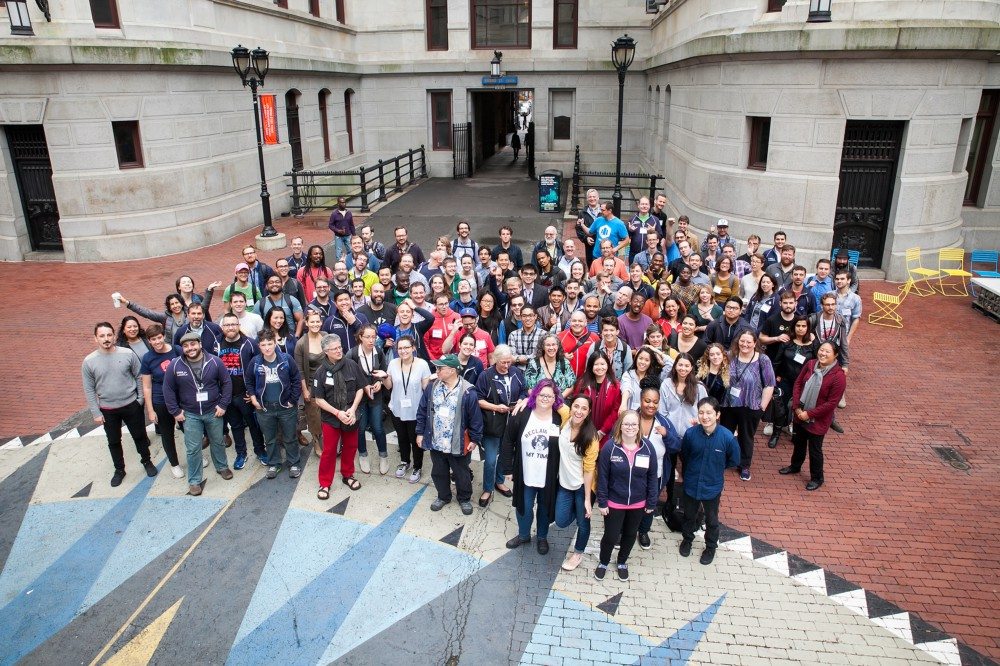When the world went virtual in 2020, working from home didn’t only extend to office hours. For many organizations, including the country’s Code for America (CfA) brigades, extracurriculars suddenly turned to Zoom and Slack, too.
Ben Treviño, CfA’s brigade program director who joined Technical.ly for an AMA on our public Slack recently, said the forced transition in the pandemic affected each local chapter differently. While some thrived with the ability to add more civic-minded technologist volunteers than ever before, including those who previously couldn’t join due to scheduling or geographic limits, others had trouble pinning down just one of the many issues the world was experiencing.
“Some brigades have been hugely successful in the transition to virtual,” Treviño said. “Meanwhile, other brigades have struggled with core contributors having to direct their focus to any one of the million other things to think about during these up and down times.”
As each local chapter made the transition, though, their leaders reflected on a question that so many of us have wondered over the past year: The world is on fire, but what can we actually do about it?
By the people
According to Treviño, CfA likes to say that in a government that operates by the people, for the people, brigades offer individuals the chance to live out the “by the people” part. The org connects tech pros — coders or not — with projects that allow them to apply their professional skills to a good cause in their free time, such as building an app or helping a nonprofit scrape data. The goal is to develop projects to better the cities they operate in, or even the whole country.
In Code for Hawaii, he said, technologists are currently working on a project called Kūkā for Maui County Council. Brigade members are building prototypes of an app developed by a local business owner that can record offline, remote testimony which can be used for agenda items at council meetings — topics like placement of dumps and renewable energy facilities, plus water and land rights.
“What does it FEEL like for a volunteer to directly engage in their community — either to directly support the frontline partners with technology or expertise, or even just to learn more about local government and community based organizations and share that knowledge with others,” Treviño wrote. “That FEELING, in my opinion, [is] the antidote to apathy, to powerlessness, to disengagement. When we experience that feeling, so much change is possible.”
Whose responsibility?
That ability to create civic change has always been a fundamental part of Code for America. Its volunteers take on projects like GetYourRefund, which helps civilians with tax issues, or Kūkā for Maui County Council, in order to establish real results. Code for Philly Communications Lead Julia Schuchard, who also joined in on the conversation, said her brigade has been involved in developing the forthcoming Glitter app that will pay neighbors to pick up trash.
But, particularly in regard to GetYourRefund, she wondered if the need for CfA to take on these types projects at all is a bit of an issue.
“The volunteer effort is great, but it’s something that should be provided for free by the government,” Schuchard wrote.
Charlotte Jackson, a rep from Code for DC, agreed. Jackson heads up the Data Driven Streets project, which uses code to more accurately report traffic accidents involving pedestrians and cyclists. The group recently scored a meeting with the DC Department of Transportation (DDOT) on how the project could help with the department’s record keeping, which currently misses about 30% of accidents according to the Code for DC project.
“It’s very cool to have such an impact but also, we’re definitely doing a job DDOT should be doing,” Jackson wrote.
Change by any means
Treviño, though, noted that the work of CfA might be a very baseline part of civilian responsibility and democracy. Using tech, he said, CfA brigades have gone so far as changing infrastructure, with one community figuring out how to get a bridge replaced when a county took too long to address the problem.
“I don’t disagree with all of the perspective on governments’ responsibility (and often ability) to take on a lot of this work,” Treviño said. “One thought I will offer on the subject — going back to ‘by the people’ — if we are a country that self-governs, might we think of the work that we do on these projects as part of that self-governance?”
But for current CfA members or those interested in joining, Treviño added that the ability to create change, even if it might seem like there should be a better way, is one of the best assets of the group.
“Change only happens with all of the local projects like we’ve been talking about,” Treviño said. “We want to offer a community for you to do that work (which can be very difficult, but even more rewarding).”
_
You can join or just follow along with conversations like this one in the #ama channel on our public Slack. Coming on Thursday, Aug. 26, for instance, Technical.ly reporters Holly Quinn and Paige Gross will lead a discussion with women-in-tech meetup organizers from across the mid-Atlantic.
Join the Technical.ly SlackJoin the conversation!
Find news, events, jobs and people who share your interests on Technical.ly's open community Slack

Delaware daily roundup: Delmarva Power vendor stats; DelDOT's $15M federal grant; 50 best companies to work for

Delaware daily roundup: Over 4,000 Black-owned businesses uncovered; Dover makes rising cities list; a push for online sports betting

Philly daily roundup: Women's health startup wins pitch; $204M for internet access; 'GamingWalls' for sports venues


